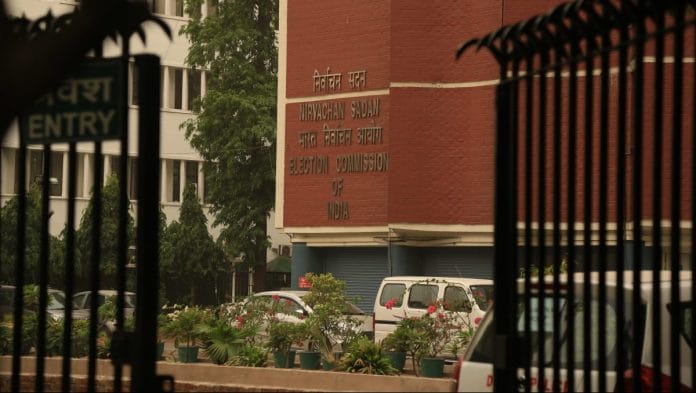To accuse only the Modi government of being solely responsible for the rot will be a fallacious argument.
Something unprecedented happened Saturday. Journalists who cover the Election Commission (EC) of India received messages asking them to reach Nirvachan Sadan, the Ashoka Road-based headquarters of our country’s election regulator, at 12.30 pm for a press conference.
Within minutes, news spread that the EC was going to announce dates for elections to five states. An hour later, another message arrived: the timing of the press conference at the EC had been shifted to 3 pm now.
Congress chief spokesperson Randeep Singh Surjewala tweeted, questioning if the time change had something to do with the fact that Prime Minister Narendra Modi was scheduled to address a rally in Ajmer in Rajasthan, one of the five states for which elections were to be announced.
The EC didn’t offer any cogent reason for the change in timing. But the incident, even if there’s a proper explanation, will only add to the EC’s dwindling stature as an independent body.
Also read: Rajasthan, four other states to go to polls in November-December, counting on 11 Dec
In the last four and half years of the Modi government, the EC, like most other so-called independent organisations, seems to have turned into just another government department where the top bosses are ready to do the government’s bidding.
But to accuse the Modi government of being solely responsible for the rot will be a fallacious argument. It started much earlier.
After all, didn’t the Manmohan Singh-led UPA government bring a former chief election commissioner – M.S. Gill – to the Rajya Sabha and then make him a minister, throwing away even the pretence of maintaining institutional integrity?
Didn’t the UPA-2 government make a hush-hush attempt to cage the unrestrained beast called the EC – too independent to the UPA’s liking – by planning to give statutory backing to the model code of conduct (MCC)?
The move fell through only after the uproar that followed my story, which gave exclusive details of the “secret” move.
What was more worrisome was the attempt by the top UPA leadership to deny the existence of any such move, which was again exposed when we published the secret note. This was after three top Congress ministers rubbished the report.
CEC more equal than ECs
For several years, there has been a demand, backed by several chief election commissioners, to give the same constitutional backing and status to the two election commissioners (ECs) as is granted to the CEC.
There are many who have demanded that Article 324 (5) of the Constitution, which deals with the issue of the removal of the CEC and the two ECs, be amended to have some parity in the process.
Currently, the CEC can’t be removed from his office except through impeachment, like judges of the Supreme Court and high courts – a difficult, if not impossible, process to remove the incumbent.
However, to remove the EC, all that the government needs is the recommendation of the CEC.
Since the three election regulators – one CEC and two ECs – function in a collegiate manner, where all decisions are taken either unanimously or through majority vote, why haven’t successive governments brought them at par when it comes to the removability clause?
Also read: Judiciary, Election Commission and RBI being ‘torn apart’ by Modi govt: Rahul Gandhi in UK
Simple: this helps keep the ECs on a tight leash.
Also, despite repeated demands, why haven’t successive governments agreed to bring in a more transparent system to appoint the ECs? Why can’t they be appointed via a collegium, which includes the leader of the opposition and the Chief Justice of India? There can be a rule stating that unless there is unanimity on the name of the candidate, he or she can’t be appointed.
When members of the Central Vigilance Commission and the Central Information Commission are appointed through the collegium system, why can’t the same be done for the EC, which is a constitutional body?
Last year, in July, the Supreme Court underlined the need to appoint ECs through a “most transparent and just process” provided under a law.
The Modi government has not shown any inkling to do the same.
Forget the appointment of ECs, the government is not even ready to grant financial freedom to the Election Commission by allowing it to charge its budget to the Consolidated Fund of India or to allow it to have its own independent secretariat.
The Congress-led UPA government didn’t do it and now the BJP-led NDA government won’t do it.
Also read: Election Commission awarded for working towards disability-friendly polls
Today, it is the BJP which may be accused of managing or browbeating the EC; tomorrow it will be some other party in power. Every political party loves a subservient “independent” regulator.
Meanwhile, it will be business as usual – forget the occasional mud-slinging and questions about the Election Commission’s independence – at Nirvachan Sadan.







Those who are very unfairly criticising the present government have forgotten ( deliberately) the days of Navin Chawla.